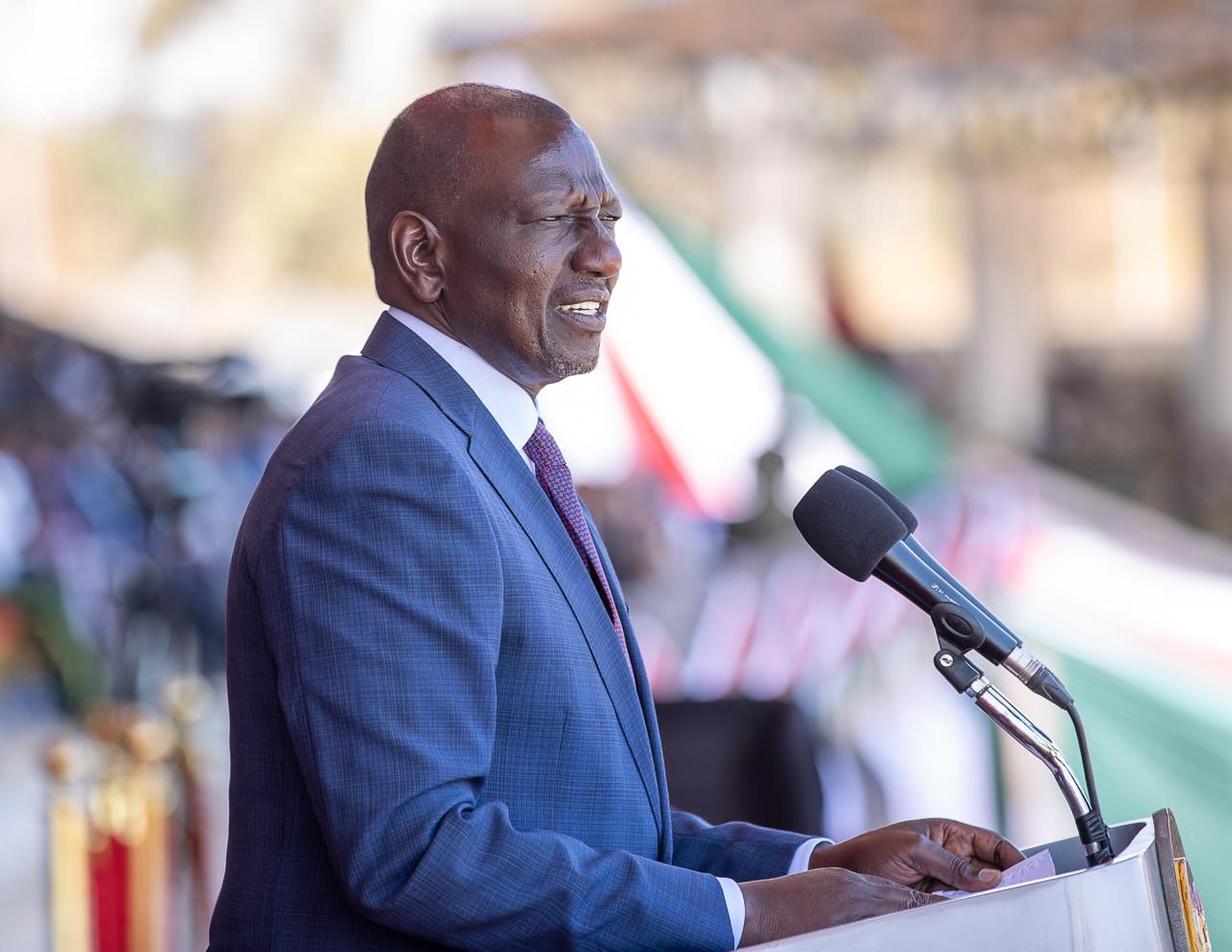

President William Ruto on Sunday led the nation in paying glowing tribute to the late former Prime Minister Raila Amolo Odinga, describing him as a “towering statesman, resolute patriot and quintessential hero” whose life offered enduring lessons on leadership and love for country.
Speaking during Mashujaa Day celebrations at Ithookwe stadium in Kitui county, Ruto dedicated the national holiday to Raila, who died on Wednesday, October 15, in India after suffering cardiac arrest while undergoing treatment.
“This is the man, the legend, the pan-Africanist, to whom we dedicate this Mashujaa Day,” the President said as he invited the crowd to observe a moment of silence in honour of the former Prime Minister.
Raila’s body was flown home on Thursday and taken to Kasarani stadium for public viewing before being moved to the Lee Funeral Home overnight.
On Friday, it was taken to Parliament for lying in state, where MPs and other dignitaries filled past the casket to pay their last respects.
A state funeral service followed at Nyayo National Stadium, attended by regional heads of state and dignitaries from across Africa.
The body was Saturday morning flown to Kisumu for viewing at Jomo Kenyatta Stadium before being taken to the family’s Opoda Farm home in Bondo.
On Sunday, a final funeral mass was held at Jaramogi Oginga Odinga University of Science and Technology before interment at the family gravesite at Kang’o Ka Jaramogi.
Raila was buried with his trademark white hat and flywhisk in a private ceremony that fulfilled his wish to be laid to rest within 72 hours of his death.
The government accorded him full state honours, including a 17-gun salute.
At the time of Mashujaa Day, Kenya was on the fifth day of the seven-day national mourning period, during which the national flag flew at half-mast.
President Ruto said it was fitting to anchor this year’s national celebrations on Raila’s “extraordinary and consequential life”, outlining five lessons the country should draw from his legacy.
“The first lesson that Baba taught us is to put country above self,” Ruto said.
“Time and again, he reminded us that no disagreement is greater than our unity, no ambition more important than our peace, and no personal interest higher than the welfare of our nation.”
The President recalled Raila’s willingness to “shake the hands of his rivals whether he won or lost,” describing it as “the measure of a great man.”
He added that when Kenya faced turbulence, the late ODM leader chose to work with him “to stabilise the nation” instead of exploiting divisions.
“For Agwambo, the spectre of a failed state was too grave to contemplate,” Ruto said.
“He understood that leadership is not about personal pride, but about preserving the Republic.”
The second lesson, he said, was Raila’s deep and unconditional love for Kenya.
“He once told us that if he were to die and God asked where he would wish to be born again, he would say without hesitation: take me back to Kenya,” Ruto recalled.
Ruto said the third lesson was Raila’s belief in closing ranks for the common good, citing his readiness to bridge political divides for national stability.
"For Baba," he said, "it was never about him becoming President; it was about Kenya having a good President."
Ruto said when the country was going through a turbulent period last year, Baba was the first to come to the table to help steady the ship, leading to the formation of the broad-based government.
“That is what heroes do: when the stakes are high, they rise above partisanship and put the country first,” the President said.
He added that the fourth lesson was unity beyond tribe and region, recalling Raila’s 2002 declaration of “Kibaki Tosha” as proof that he saw beyond geography and ethnicity and viewed Kenya as “one united nation under God.”
"He often urged us to think of Kenya first, to let the idea of one nation under one flag rise above all else," he said.
“It would be a desecration of his legacy if we were to allow ourselves to be divided by sectarian interests,” Ruto said.
The fifth and final lesson, the President noted, was Raila’s unwavering optimism even in adversity.
“He endured prison, persecution, and political defeat, yet never surrendered to bitterness or gave in to hopelessness,” Ruto said.
“His life was a constant reminder that no setback is final, no dream too distant, and no obstacle insurmountable for a people determined and united by purpose.”
Ruto concluded by pledging to honour Raila’s dream of a just, prosperous, and united Kenya.
“The ‘glory land’ that he saw at the mountaintop is the better, greater and more perfect union to which we must now, on this Mashujaa Day, dedicate ourselves anew,” he said.















